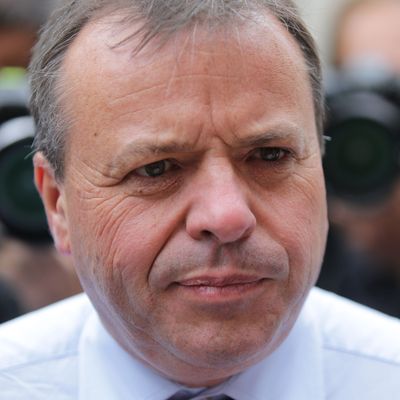
In 2016, Vladimir Putin reaped two of his greatest foreign policy triumphs in quick succession. The United Kingdom voted narrowly to exit the European Union, advancing a longstanding Russian goal of splitting Western allies that have long been united against it. Later that year, the United States voted even more narrowly to elect Donald Trump president.
Friday evening, the New York Times revealed new detail about Russian involvement in the Brexit vote. The more we learn, the more similar the pattern of behavior in the two countries becomes clear, and the more suspicious the denials of Putin’s partners grows.
In both countries, the right-wing pro-Russian populists indignantly insist there is no more incriminating information to be found beyond what was known at any given moment, even as the bounds of what is known at any moment continues to expand. In Britain, billionaire businessman Arron Banks financed the Brexit referendum with the largest donation in British history. Initially, he copped to having one meeting with Russian officials. After the Guardian obtained secret documents blowing up this claim, he admitted there were actually three meetings. Now the Times has even more information, and Banks concedes the number of covert meetings has grown to four.
At the secret meetings with Russians, Banks was dangled the prospect of lucrative gold and mining deals. In the course of speaking with the Times, Banks changed his story: “In interviews earlier this week, Mr. Banks initially said he knew nothing about the [mining] project. Then he later said he remembered hearing about it from the investment banker but did not pursue it.”
Well, that sounds innocent.
Banks continues to insist he never actually took up the Russians on the offer of cutting him in on their mining deals at a favorable price. This denial seems extremely hard to credit. For one thing, Banks tweeted at the time that he was buying up gold and mining stocks.
Banks’s defense of his behavior to the Times is so absurdly suspicious it almost reads like a winking, dada joke: “The idea that things were dangled as some sort of carrots for me to be involved with the Russians is very far-fetched,” he said. “I wonder what the Russians wanted from me?” What they wanted was perfectly obvious: Banks funded a political referendum in which Russia had a strong interest in passing. Russia could not directly finance the referendum, but Banks could. Therefore, what they would want is for him to use some of the money they were dangling before him to support Brexit, which he did. At this point, it seems virtually certain that Russia did use Banks as a pass through to covertly finance the Brexit referendum.
Meanwhile, back in the United States, Donald Trump and many members of his inner circle have a long trail of financial ties to Russia. The overt behavior looks remarkably similar. Trump and his cronies refuse to disclose their precise financial connections (by, for instance, following the established norm of a presidential candidate publishing his tax returns.) They continuously lie about the number and nature of their covert contacts with Russian officials, then keep insisting with each new disclosure that there is no more to disclose and the whole question is a witch hunt. Meanwhile, they continue to deliver a policy outcome payoff to Putin.
Yesterday alone, reports have emerged that Trump offered Emmanuel Macron a better deal if France would exit the European Union, refused to rule out accepting Russia’s claim to seized territory from Ukraine, and that his government is studying the possibility of withdrawing troops from Germany. Like Banks’s winking “what could the Russians have wanted from me?” defense, Trump is virtually daring his critics to draw the obvious conclusion.
Update: I mistakenly described Banks as a “billionaire.” He is not remotely so wealthy, as Banks himself jokes:
Guardian journalist Carole Cadwalladr likewise points out Banks cannot even afford to live in the home he shows off:
His lack of wealth of course increases the suspiciousness of the case. How could Banks afford the largest political donation in the history of the United Kingdom? Unless he was being used as a pass-through for Russia?






























